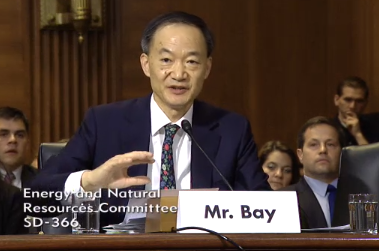By Ted Caddell
Attorneys for hedge fund twins Rich and Kevin Gates and their associate Houlian “Alan” Chen asked the Federal Energy Regulatory Commission on Tuesday for more time to respond to market manipulation allegations that could carry fines totaling nearly $30 million.
The reason? They argue that FERC’s Office of Enforcement has unfairly withheld evidence that could prove that PJM’s Independent Market Monitor didn’t think their trading strategy — which collected line-loss rebates on what FERC contends were riskless up-to-congestion trades — was illegal.
Their motion (IN15-3), which was filed after the Office of Enforcement denied their request for the information on Monday, asks the commission to compel its release and grant them a two-week extension on the Feb. 2 deadline for responding to the allegations.
FERC issued an Order to Show Cause in December seeking $29.8 million in fines in an unusually high-profile case that figured in a debate over FERC enforcement policy during Commissioner Norman Bay’s confirmation process earlier this year. (See FERC Staff Seeks $30 Million Fine in Powhatan Case.)
The Gates brothers and Chen, who traded on behalf of their Powhatan Energy Fund, have denied wrongdoing.
In their filing, they say that they’ve learned that the Office of Enforcement has a tape in which PJM’s Independent Market Monitor Joe Bowring is talking to another trader discussing trades like those at the heart of the Powhatan investigation.
According to the filing, on the tape, “Dr. Bowring says that the trades did not violate the rules, that he understands why the traders engaged in them and that the rules need to be changed to remove the incentives that drove the trading. He also says that he would not refer the trading conduct to Enforcement if the traders stopped the trading in question.
“That last point is key because the PJM Tariff requires Dr. Bowring to refer trading that he thinks might be market manipulations,” according to the filing.
Under the so-called Brady rule, prosecutors are required to provide targets exculpatory evidence in the government’s possession.
The Gates’ attorneys said they asked for possible Brady material in August, and although materials were provided, the tape recording in question was not. On Monday, Enforcement refused to agree to an extension of the Feb. 2 deadline, and on Tuesday the attorneys filed the request with the full commission to grant the extension.
The filing notes that Enforcement recently asked PJM to run simulations that could have relevance to their case. The Gates’ attorneys asked for those as well.
“It appears that Enforcement has asked for PJM to perform these simulations for purposes of addressing alleged market harm related to the trades at issue,” the filing said. “That request could have been made years ago. Instead it was made after the Show Cause Order issued, while we were preparing our response.”
In an interview yesterday, Kevin Gates declined to say how he learned of the recording. He said he was surprised to learn that the Enforcement apparently had it and didn’t share it with his attorneys.
“If this doesn’t count as something under Brady,” he said, “why even have a Brady policy? What is the purpose?”
In his Senate confirmation hearing in May, Bay — then the director of the Office of Enforcement — said the office adopted the Brady doctrine at his suggestion.
Bay was responding to criticism by former FERC General Counsel William Scherman and other members of the energy bar that the commission has engaged in heavy-handed enforcement tactics. Scherman alleges that FERC officials have failed to abide by the doctrine. (See LaFleur Cruises, Bay Bruises in Confirmation Hearing.)
Bay’s replacement, acting Enforcement Director Larry Gasteiger, responded to similar allegations at an Energy Bar Association forum in April. (See FERC, CFTC Reject Due Process Complaints.)
FERC spokeswoman Mary O’Driscoll declined comment yesterday on the Gates’ filing. Bowring could not be reached for comment.



